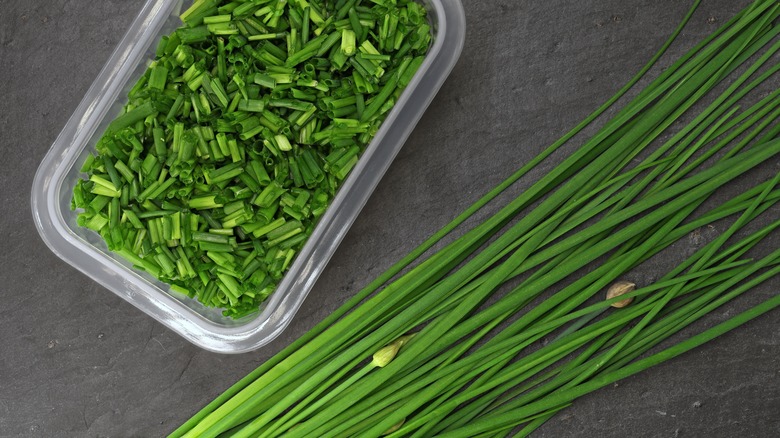Why You May Want To Avoid Cooking Chives
Thin, fragile, grass-like, and vibrant green, chives add slight crunch and subtle onion flavor to many dishes. Chives are a relative of the allium family — the home of onions, shallots, garlic, leeks, and scallions (via MasterClass). They provide an earthy kick of flavor, and usually without the unpleasant onion breath. They also have an entire list of health benefits associated with them. They include choline and folate, which improve memory, and vitamin K, which is linked to preventing osteoporosis (per WebMD). Whether you're eating them dried or freshly chopped, just a sprinkle of 'em on top of your dinner will not only allow you to reap the benefits, but act as the missing puzzle piece to the flavor you needed.
Most produce in the allium family yields a similar flavor, with different levels of pungency. Of course, onions are the most flavorful, with shallots being slightly sweeter; scallions resemble chives the most with their green, stalk-like figure. You might assume you can swap these family members in and out for one another in recipes, but it's important to remember that cooking chives yields a completely different flavor.
They lose their texture and flavor
According to EatingWell, chives should be consumed raw and cooked only briefly. When cooking them too long, their texture tends to wilt, which will deplete them of their flavor. When chopped fresh, this releases their onion-y flavor that we all crave. MasterClass states that chives cannot withstand high cooking temperatures like green onions can because of their more delicate stems and naturally mild flavor. This is why they make such wonderful garnishes — and are often considered more of an herb rather than a vegetable. You can also always add them to chilled dips, salad dressings, compound butters, or even atop deviled eggs for that extra pop of green color and punch of onion-y zing.
Furthermore, chives don't last very long once you bring them home from the store. They tend to be in their prime within one to two days after purchasing, but if stored properly, can hopefully be extended. According to EatingWell, you should wrap them in a damp paper towel and store them in an airtight container in the refrigerator.

